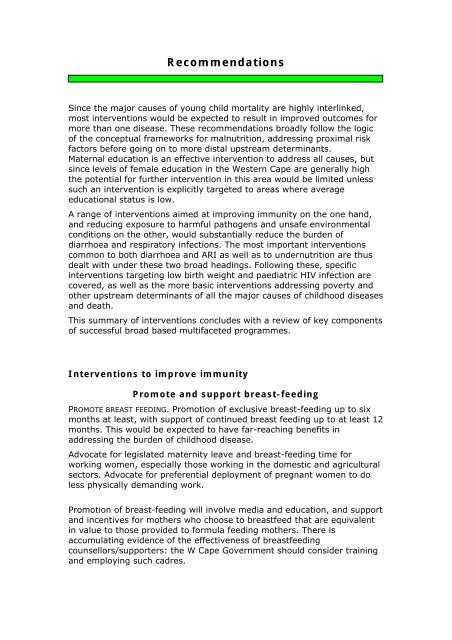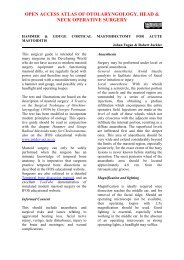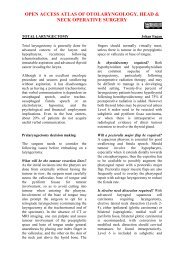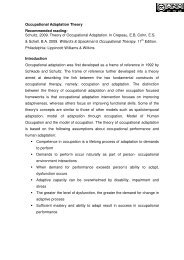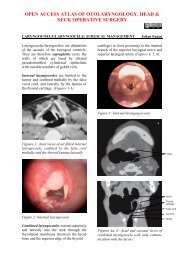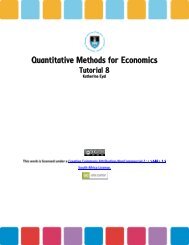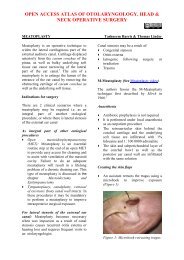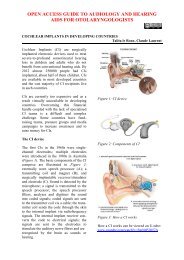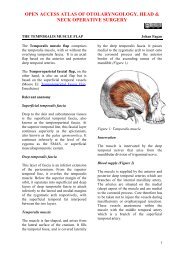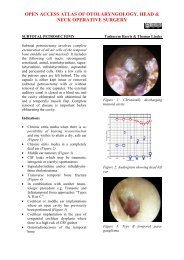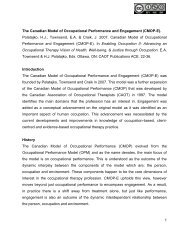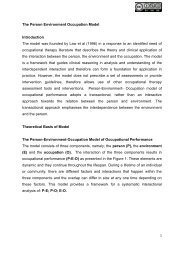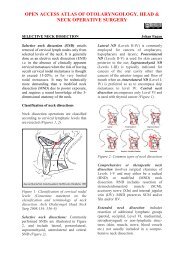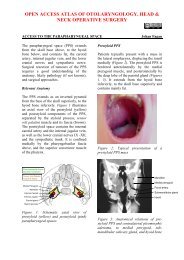Decreasing the Burden of Childhood Disease - Western Cape ...
Decreasing the Burden of Childhood Disease - Western Cape ...
Decreasing the Burden of Childhood Disease - Western Cape ...
Create successful ePaper yourself
Turn your PDF publications into a flip-book with our unique Google optimized e-Paper software.
Recommendations<br />
Since <strong>the</strong> major causes <strong>of</strong> young child mortality are highly interlinked,<br />
most interventions would be expected to result in improved outcomes for<br />
more than one disease. These recommendations broadly follow <strong>the</strong> logic<br />
<strong>of</strong> <strong>the</strong> conceptual frameworks for malnutrition, addressing proximal risk<br />
factors before going on to more distal upstream determinants.<br />
Maternal education is an effective intervention to address all causes, but<br />
since levels <strong>of</strong> female education in <strong>the</strong> <strong>Western</strong> <strong>Cape</strong> are generally high<br />
<strong>the</strong> potential for fur<strong>the</strong>r intervention in this area would be limited unless<br />
such an intervention is explicitly targeted to areas where average<br />
educational status is low.<br />
A range <strong>of</strong> interventions aimed at improving immunity on <strong>the</strong> one hand,<br />
and reducing exposure to harmful pathogens and unsafe environmental<br />
conditions on <strong>the</strong> o<strong>the</strong>r, would substantially reduce <strong>the</strong> burden <strong>of</strong><br />
diarrhoea and respiratory infections. The most important interventions<br />
common to both diarrhoea and ARI as well as to undernutrition are thus<br />
dealt with under <strong>the</strong>se two broad headings. Following <strong>the</strong>se, specific<br />
interventions targeting low birth weight and paediatric HIV infection are<br />
covered, as well as <strong>the</strong> more basic interventions addressing poverty and<br />
o<strong>the</strong>r upstream determinants <strong>of</strong> all <strong>the</strong> major causes <strong>of</strong> childhood diseases<br />
and death.<br />
This summary <strong>of</strong> interventions concludes with a review <strong>of</strong> key components<br />
<strong>of</strong> successful broad based multifaceted programmes.<br />
Interventions to improve immunity<br />
Promote and support breast-feeding<br />
PROMOTE BREAST FEEDING. Promotion <strong>of</strong> exclusive breast-feeding up to six<br />
months at least, with support <strong>of</strong> continued breast feeding up to at least 12<br />
months. This would be expected to have far-reaching benefits in<br />
addressing <strong>the</strong> burden <strong>of</strong> childhood disease.<br />
Advocate for legislated maternity leave and breast-feeding time for<br />
working women, especially those working in <strong>the</strong> domestic and agricultural<br />
sectors. Advocate for preferential deployment <strong>of</strong> pregnant women to do<br />
less physically demanding work.<br />
Promotion <strong>of</strong> breast-feeding will involve media and education, and support<br />
and incentives for mo<strong>the</strong>rs who choose to breastfeed that are equivalent<br />
in value to those provided to formula feeding mo<strong>the</strong>rs. There is<br />
accumulating evidence <strong>of</strong> <strong>the</strong> effectiveness <strong>of</strong> breastfeeding<br />
counsellors/supporters: <strong>the</strong> W <strong>Cape</strong> Government should consider training<br />
and employing such cadres.


